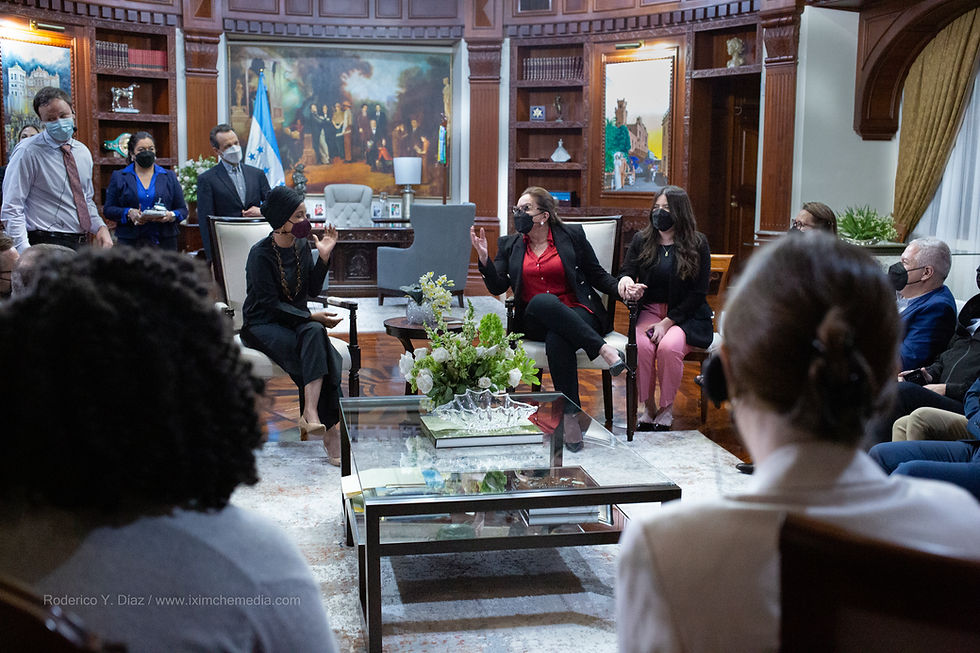‘Broken Windows’ in Honduras: Giuliani and NYPD contracted as consultants for Honduran security
- May 30, 2018
- 3 min read
Updated: Mar 8, 2019
On May 10, 2018, a high-level delegation of Honduran security officials led by Security Minister Julian Pacheco was in New York City for meetings with the Giuliani Security and Safety (GSS) consulting firm and the NYPD’s police academy. Both GSS and the NYPD have been retained as consultants on the question of how to lower the catastrophic level of violent crime in Honduras.
Rudolph Giuliani and his firm have previously done work with regional governments known to have committed gross human rights abuses, including those of Mexico, Guatemala, and Honduras. In late 2014, he was also contracted by El Salvador’s right-wing National Association for Private Enterprise to help form an independent security strategy. There, he was paid millions of dollars to advocate for policies that government officials found redundant and counterproductive.* The spokesman for the Security Ministry, Jair Meza, told El Heraldo that the training contracted to GSS and the NYPD will be implemented at all levels of the Honduran National Police, from high-ranking officials to ground-level officers.
There are a number of things about the retention of GSS and the NYPD by Honduran security officials that we find disturbing. The first and most obvious is that Rudolph Giuliani, now working as a personal attorney for President Trump, is making money in the private sector (through the auspices of the Inter-American Development Bank, no less) through his connection to Honduran security forces. We have previously written about our concern about the Trump Administration’s close relationship with the Honduran regime and security forces through John Kelly, but this is another layer of conflicts of interest when it comes to U.S. policy in Honduras.
The second area of concern for us is that GSS promotes the failed and brutal ‘Broken Windows’ policing policy with the governments for whom it consults. In 2014, in the context of his firm’s consulting contract with the Guatemalan state, Giuliani said,“When you have a tremendous amount of crime in your society, you are not going to solve it with schools, libraries, nice neighborhoods and sports teams. You have to emphasize law enforcement. As soon you get the crime down, the next thing you do is build up the social programs. That’s when you create more jobs, better neighborhoods, better schools.”
This is, of course, the exact inverse of the effective way to address crime, doesn’t really work, and besides that leaves out the many structural and institutional differences between addressing crime in New York City and in Honduras. It also directly contradicts State Department policies in high-crime cities like Tegucigalpa and San Pedro Sula, which, however flawed, are based on the idea that providing jobs, education, and public spaces is the best way to prevent violence. Along with then-General Kelly’s unwavering support for Honduran President Juan Orlando Hernández’s policies of militarization, this represents a very worrying approach to the question of Honduran insecurity from multiple members of Trump’s team.
None of these concerns about increasingly militarized and criminalized approaches to addressing violence in Honduras are in the least alleviated by the presence of the NYPD. Just in the past few years, NYPD have been accused of human rights violations in their repression of Occupy Wall Street, their employment of stop-and-frisk, which targeted black and brown people for unconstitutional searches, and innumerable cases of police brutality, most emblematically in the extrajudicial killing of Eric Garner.
For NYPD and Giuliani to be consulting Honduran security forces that have so recently committed crimes against humanity and have taken a brutal and counterproductive approach to the questions of gang violence and migration is, while not surprising, another level of U.S. complicity in the ongoing violations of Honduran human rights. That Julian Pacheco, who is personally implicated in much of the horror of the post-electoral crisis and also has been accused in U.S. courts of collusion with narcotraffickers, to receive the kind of welcome and cooperation he did from powerful U.S. businesses and institutions is disturbing to us as citizens of the United States.
This is yet another in a long line of reasons for us to continue our call for the immediate passage of the Berta Cáceres Human Rights in Honduras Act. U.S. collaboration with Honduran security forces is immoral, and enables the utter inhumanity with which the Hernández government rules the country. Please ask your member of congress to support the bill, and to repudiate Kelly, Giuliani, and the NYPD’s support for the gross human rights violations committed by the Honduran regime.
Pa’lante,
Ryan and Aleja
*CORRECTION: The original version of this article said Giuliani had previously been contracted by the Salvadoran government. Witness for Peace Honduras regrets the error.




Comments